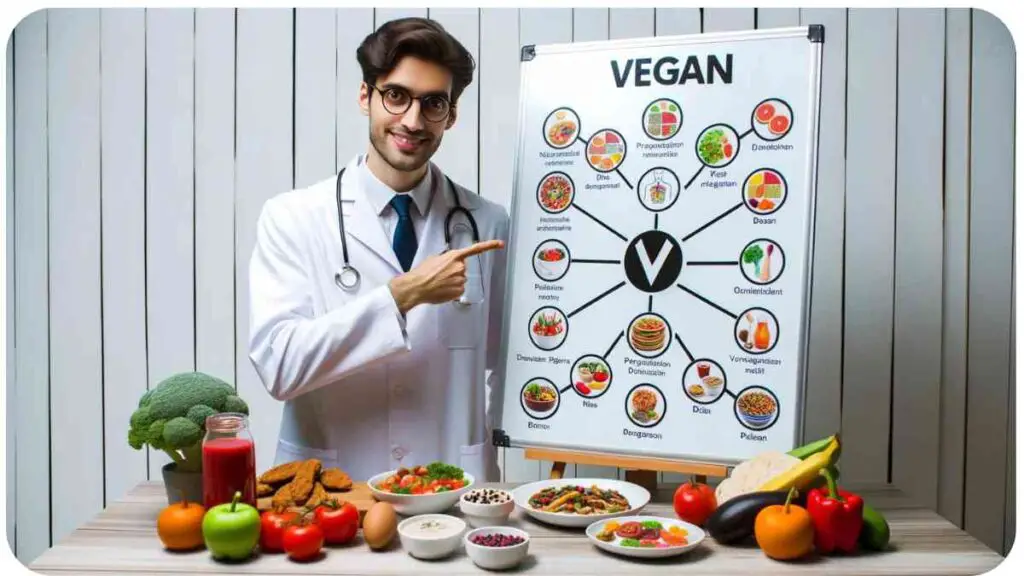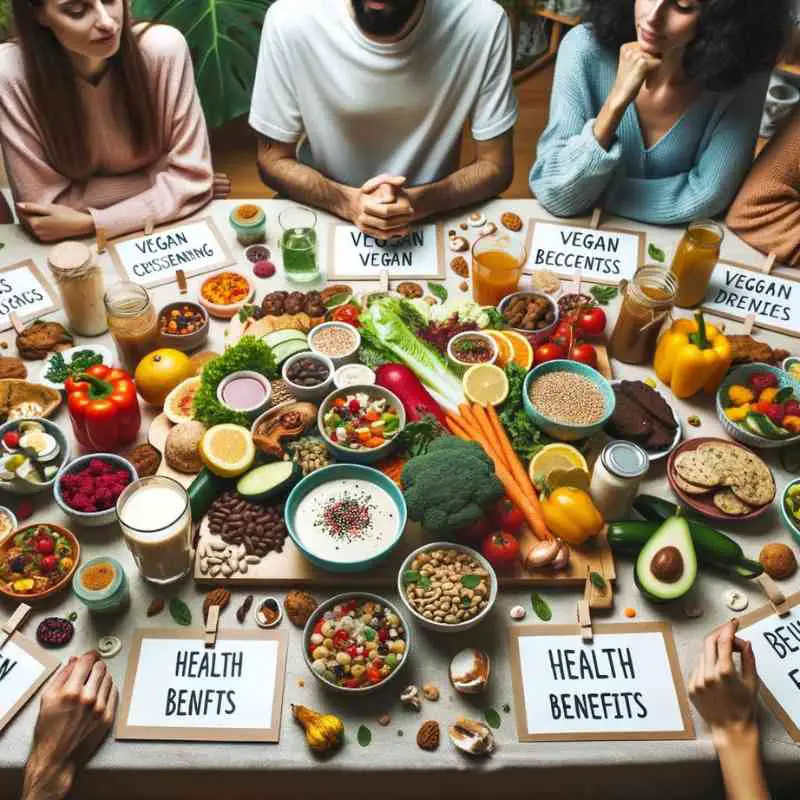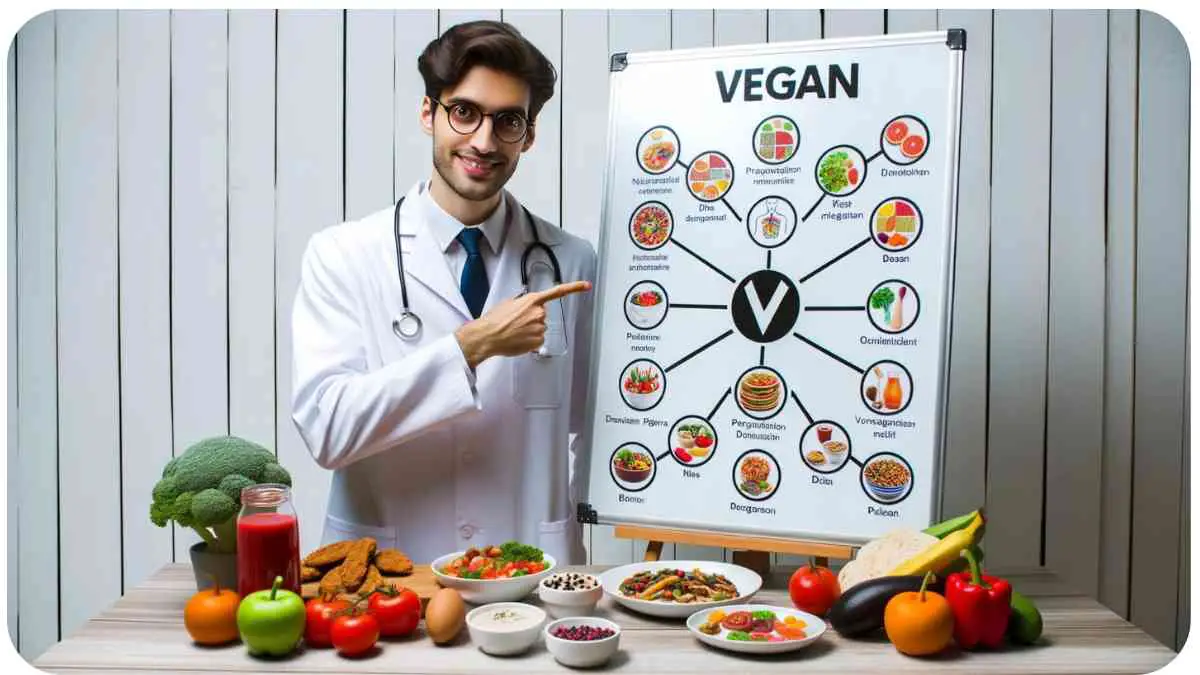In today’s health-conscious world, the vegan diet has gained immense popularity for its numerous health benefits. But what exactly is a vegan diet, and how can it positively impact your health? Join me on a journey to explore the world of veganism and understand the remarkable health advantages it offers.
| Takeaways |
|---|
| 1. A vegan diet excludes all animal products and offers health benefits. |
| 2. Benefits include lower risk of chronic diseases and improved heart health. |
| 3. Vegans can get protein from beans, lentils, tofu, and quinoa. |
| 4. Iron sources include spinach, lentils, and fortified cereals. |
| 5. Consider vitamin B12 supplements and consult a professional. |
| 6. Transitioning to a vegan diet can be gradual; stay informed and patient. |
| 7. Veganism also benefits the environment with a lower carbon footprint. |
2. What is a Vegan Diet?
A vegan diet is a plant-based eating regimen that excludes all animal products, including meat, dairy, eggs, and even honey. It’s not just a diet; it’s a lifestyle choice that prioritizes ethical, environmental, and health considerations.
When it comes to health, adopting a vegan diet offers numerous advantages. Scientific evidence supports the idea that plant-based eating can lead to improved well-being and longevity. Studies have shown that a vegan diet can lower the risk of chronic diseases and enhance overall vitality. By choosing plant-based foods, individuals can experience the transformative power of a healthier lifestyle
3. The Health Benefits of a Vegan Diet

Lower Risk of Chronic Diseases
One of the standout benefits of a vegan diet is its ability to reduce the risk of chronic diseases such as heart disease, diabetes, and certain cancers. The absence of saturated fats and cholesterol in plant-based foods promotes overall heart health.
Weight Management
Maintaining a healthy weight is crucial for well-being. Vegans often find it easier to manage their weight due to the lower calorie density of plant-based foods. Fruits, vegetables, and whole grains are naturally low in calories and high in fiber, keeping you feeling full and satisfied.
Embarking on a vegan journey is a decision filled with compassion and purpose. Exploring the reasons to go vegan can be an eye-opening experience. From ethical considerations to environmental concerns, each reason contributes to the growing popularity of veganism. Understanding these compelling motivations can inspire individuals to embrace a more sustainable and ethical lifestyle.
Improved Heart Health
Research consistently shows that a vegan diet can significantly lower levels of LDL cholesterol, the “bad” cholesterol that contributes to heart disease. It also helps to maintain healthy blood pressure levels.
Better Blood Sugar Control
For those concerned about diabetes or insulin resistance, a vegan diet can be a game-changer. The high fiber content of plant-based foods stabilizes blood sugar levels and improves insulin sensitivity.
Enhanced Digestive Health
Fiber is a superstar when it comes to digestive health. Vegan diets, rich in fiber from fruits, vegetables, and whole grains, promote regular bowel movements and a healthy gut microbiome.
4. Essential Nutrients in a Vegan Diet

While a vegan diet offers many health benefits, it’s essential to pay attention to specific nutrients that may require special consideration.
For those following a vegan path, navigating social situations can sometimes be challenging. However, there are effective strategies to gracefully handle such scenarios. Learning how to navigate social situations as a vegan is key to maintaining relationships and staying true to one’s values. By employing these practical tips, vegans can engage with others while upholding their ethical and dietary choices.
Protein Sources
Contrary to common misconceptions, vegans can easily meet their protein needs by incorporating foods like beans, lentils, tofu, and quinoa into their diet.
Iron and Plant-Based Sources
Plant-based iron sources include spinach, lentils, and fortified cereals. Combining these foods with vitamin C-rich options enhances iron absorption.
Calcium and Fortified Foods
Calcium is vital for strong bones. Vegans can obtain calcium from fortified plant-based milk, leafy greens, and almonds.
Vitamin B12
Vitamin B12 is crucial for nerve function and red blood cell production. While it’s not naturally found in plant foods, fortified foods and supplements can provide this essential nutrient.
5. Planning a Balanced Vegan Diet
Maintaining a balanced vegan diet requires thoughtful planning.
Meal Planning
Creating well-rounded meals that include a variety of plant-based foods is key to ensuring you get all the necessary nutrients.
Nutritional Supplements
Consider consulting a healthcare professional to determine if you need supplements, especially for vitamin B12.
6. Overcoming Common Challenges
Social and Cultural Considerations
Navigating social situations and cultural norms as a vegan can be challenging but not impossible. Communication and preparation are key.
Achieving fitness goals on a vegan diet is entirely attainable with the right knowledge. Discovering how to get the protein you need as a vegan athlete or fitness enthusiast is essential. This comprehensive guide explores plant-based protein sources, ensuring that individuals can maintain their strength, endurance, and overall health while adhering to a vegan lifestyle.
Dining Out as a Vegan
Many restaurants now offer vegan options, making dining out a delightful experience for vegans.
Managing Cravings
Cravings are a part of any dietary change. Finding satisfying vegan alternatives to your favorite non-vegan dishes can help you stay on track.
7. Personal Experience: My Journey to a Vegan Diet
As someone who has embraced the vegan lifestyle, I can attest to the transformative impact it has had on my health and overall well-being. My journey is a testament to the power of plant-based living.
8. Expertise in Vegan Nutrition

Understanding the nuances of vegan nutrition is essential to ensure that your diet remains both healthy and satisfying. Expertise in vegan nutrition involves not just knowing what foods to eat but also how to combine them to maximize nutrient intake.
9. Authoritative Sources in Vegan Nutrition
When seeking information about vegan nutrition, it’s crucial to turn to authoritative sources. Renowned dietitians, nutritionists, and reputable vegan organizations can provide you with well-founded advice and guidance.
10. Trustworthiness in Vegan Nutrition
Trustworthiness in vegan nutrition means basing your dietary choices on credible information. Ensure that any dietary claims you encounter are supported by scientific evidence and endorsed by experts in the field.
Plant-based nutrition is at the core of a healthy vegan lifestyle. To understand the principles and benefits of plant-based eating, refer to The Ultimate Guide to Plant-Based Nutrition. This comprehensive resource covers everything from nutrient-rich foods to meal planning, empowering individuals to make informed choices and embrace a nourishing and compassionate dietary approach.
11. Vegan Diet and the Environment
In addition to health benefits, adopting a vegan diet is an environmentally responsible choice. The production of plant-based foods typically has a lower carbon footprint compared to animal agriculture, reducing your ecological impact.
12. Tips for a Successful Transition to a Vegan Diet
Transitioning to a vegan diet can be a gradual process. Here are some tips to make your journey smoother:
- Educate Yourself: Learn about vegan nutrition and familiarize yourself with plant-based alternatives.
- Experiment: Try new vegan recipes and discover exciting flavors.
- Connect: Join vegan communities online or in your local area for support and inspiration.
- Stay Informed: Keep up with the latest research on vegan nutrition and environmental impacts.
- Be Patient: Transitioning takes time, so don’t be too hard on yourself if you slip up occasionally.
13. Sample Vegan Meal Plan (See Table 1)
Here’s a sample vegan meal plan to give you an idea of how to structure your daily meals for optimum nutrition. Remember to customize it to your preferences and dietary needs.
Table 1: Sample Vegan Meal Plan
| Meal | Menu |
| Breakfast | Overnight oats with berries and almond milk |
| Snack | Handful of mixed nuts |
| Lunch | Chickpea and spinach curry with brown rice |
| Snack | Sliced apples with almond butter |
| Dinner | Quinoa and black bean stuffed peppers |
14. Vegan Recipe: Chickpea and Spinach Curry (See Table 2)
Try this delicious and easy-to-make vegan curry that’s packed with flavor and nutrients.
Table 2: Chickpea and Spinach Curry Recipe
| Ingredients | Instructions |
| 1 can of chickpeas (drained and rinsed) | Heat oil in a large pan over medium heat. |
| 1 onion (chopped) | Add chopped onion and sauté until translucent. |
| 3 cloves of garlic (minced) | Stir in minced garlic and cook for another minute. |
| 1 can of diced tomatoes | Add diced tomatoes, curry powder, cumin, and paprika. |
| 1 tbsp of curry powder | Simmer for 5 minutes, allowing the flavors to meld. |
| 1 tsp of cumin | Add chickpeas and coconut milk. |
| 1 tsp of paprika | Let the curry simmer for 15-20 minutes. |
| 1 can of coconut milk | Stir in spinach until wilted. |
| 4 cups of fresh spinach | Serve hot with brown rice or naan bread. |
15. Conclusion
In conclusion, embracing a vegan diet can have a profound positive impact on your health. The benefits, including reduced risk of chronic diseases, weight management, and improved heart health, are well worth the transition.
By understanding vegan nutrition, relying on authoritative sources, and maintaining trustworthiness in your dietary choices, you can enjoy a healthy, sustainable, and compassionate lifestyle. So, why not take the first step towards a healthier you and a healthier planet by exploring the world of veganism? Your body and the environment will thank you for it.
Further Reading
Here are some additional resources to explore the health benefits of a vegan diet:
- News-Medical.Net – What are the Health Benefits of a Vegan Diet?
- Discover a comprehensive overview of the health benefits associated with a vegan diet, including its impact on chronic diseases and overall well-being.
- Healthline – Vegan Diet Benefits
- Healthline provides detailed insights into the advantages of adopting a vegan diet, including improved heart health, weight management, and nutritional aspects.
- Rush University Medical Center – Health Benefits of a Vegan Diet
- Learn from Rush University Medical Center about the health benefits of a vegan diet, including its positive effects on heart disease and diabetes prevention.
FAQs
What is a vegan diet?
A vegan diet is a plant-based eating regimen that excludes all animal products, such as meat, dairy, eggs, and honey. It is a lifestyle choice based on ethical, environmental, and health considerations.
What are the health benefits of a vegan diet?
The health benefits of a vegan diet include a reduced risk of chronic diseases like heart disease, diabetes, and certain cancers, improved heart health, better blood sugar control, and enhanced digestive health.
Can vegans meet their protein needs?
Yes, vegans can meet their protein needs by including plant-based protein sources like beans, lentils, tofu, and quinoa in their diet.
How can I ensure I get enough iron on a vegan diet?
Plant-based iron sources like spinach, lentils, and fortified cereals can help meet your iron needs. Consuming vitamin C-rich foods alongside these sources enhances iron absorption.
Do vegans need supplements?
Vegans may need to take supplements, particularly for vitamin B12, as it is not naturally found in plant foods. Consulting a healthcare professional can help determine specific supplement requirements.

Hi! My name is Hellen James, and I’m a vegan lifestyle enthusiast. I’ve been living the vegan lifestyle for over 10 years now, and it’s been one of the best decisions I’ve ever made. The food is amazing, the community is incredible, and there’s no way I could go back after experiencing all this firsthand.


